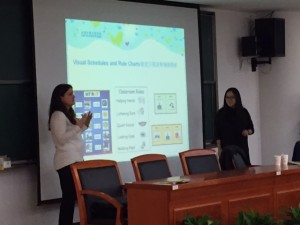During the month of April, Jamie Fanelli, Lead Learning and Behavior Specialist at LIH Olivia’s Place, delivered a three-part parenting workshop at Wellington College Bilingual to an enthusiastic group of parents and caregivers. The workshop, entitled “The Empowered Preschooler Series,” introduced learning principles that are key to understanding child behavior and provided strategies based on these principles. The parents and caregivers gained better insight on “why their child keeps behaving in that way” and were given ideas for addressing negative behaviors using positive methods.
During the initial workshop, “ABC’s of Behavior & Beyond: Connecting Learning, Behavior and Positive Parenting,” the parents were educated about a new way of looking at behavior. Ms. Fanelli introduced the basic principles that govern how children learn and discussed how these principles shape child behavior. The parents learned that the building blocks of behavior include antecedents, what comes right before or ‘triggers’ the behavior, and consequences, what occurs immediately following the behavior. The parents discussed their child’s problem behaviors with one another and learned how altering the triggers and consequences can change the behavior over time. They discussed how prevention should often be their first goal and learned how to identify and anticipate the triggers to their child’s problem behavior. Ms. Fanelli outlined some prevention strategies, including:
• Establishing clear expectations and consequences
• Giving their child more choices
• Redirecting their child’s attention to another activity
• Breaking down difficult tasks
• Helping their child prepare for transitions using time warnings and/or visual schedules
Ms. Fanelli and the parents then discussed the different types of consequences, or ways to respond to the behavior. Ms. Fanelli emphasized that traditional discipline around the world focuses on punishment; however, research has indicated that it’s far more effective to focus on reinforcement. In contrast, parents also learned that sometimes no attention is better than negative attention as attention from an adult is powerful and can sometimes increase the problem behavior. Ms. Fanelli suggested parents try ignoring inappropriate attention-seeking behavior, especially when a child is whining or pouting. Behavior management systems, such as reward charts, were also discussed and examples were illustrated. Ms. Fanelli emphasized that rewards should be linked to specific behaviors and always delivered consistently.
Ms. Fanelli then discussed the differences between positive reinforcement and bribery. She stressed that bribing children with the promise of a reward while they are misbehaving is ineffective and counterproductive. The parents and caregivers then actively participated by turning bad behaviors ‘upside down’ by looking at behaviors in a new light. They learned that almost every bad behavior they are tempted to punish could be turned into a positive behavior they can positively reinforce. For example, parents could positively reinforce their child when he puts away a toy as opposed to only reprimanding him when he doesn’t clean up. The parents learned specific ways to teach positive behaviors, including:
• Explaining the desired behavior to the child
• Modeling it
• Practicing it
• Positively reinforcing it.
The parents and caregivers returned on the second day to learn about “A New Way to Say No” and promote positive behavior in children. The workshop reviewed the building blocks of behavior and focused on using the power of positive reinforcement to improve children’s behavior. Ms. Fanelli emphasized that positive reinforcement is one of the most effective tools a parent can utilize and can be delivered in many different forms, such as praise, given a reward or access to a favorite activity. The parents learned the most effective ways to use praise and encouragement, such as:
• Be specific and tell their child exactly what they like
• Keep the praise simple
• Avoid combining encouragement with criticism
• Be very generous with it
• Use the magic ratio of 5:1—praise 5 more times than they criticize or correct
The parents left the workshop empowered and ready to try some new ways of using positive reinforcement that they discussed.
The third and final workshop, “Tame the Terrible Tantrums: Understanding and Responding to Challenging Behaviors,” outlined effective parenting strategies to use when responding to problem behaviors. The parents put on their detective hats and learned more about understanding why the behavior occurs in the first place: the child is trying to communicate something, such as ‘I want you to pay attention to me’ or “I don’t want to stop and clean up.” Ms. Fanelli reviewed and emphasized the effectiveness of positive reinforcement as well as the problems with physical punishment. She discussed that physical punishment, such as spanking, models aggression and often portrays the parent as the ‘bad guy’ rather than focusing on the bad decision the child made. Children often respond to physical punishment by hiding and do not always change their problem behavior. Extensive research shows physical punishment is harmful, counterproductive and linked to antisocial behavior and mental health problems. Ms. Fanelli outlined alternative strategies, including using logical consequences and time-outs.
Logical consequences are negative consequences for problem behavior that the parent decides upon and are logically connected to the behavior. For example, if a child throws a toy at his friend, the parents take the toy away. Ms. Fanelli emphasized that children are not born with an ability to make decisions and accept the consequences and therefore need lots of practice and encouragement to learn how to take responsibility for their actions. Ms. Fanelli encouraged parents to begin by targeting one to three problem behaviors and explicitly teaching the child the rules through modeling, role-playing, using photos, and providing consistent feedback and encouragement. She also emphasized to use positive commands by telling their child what to do instead of what not to do. For example, a parent may tell their child to kick the ball into the net instead of telling them to stop kicking the ball at me. Ms. Fanelli and the parents then discussed using ‘time outs’ as a way to increase the child’s compliance and decrease problem behaviors. During the ‘time out,’ the child would be taken to a quiet area free of toys and given minimal attention. ‘Time outs’ are widely recommended as they are effective, nonviolent and give everyone time to cool down.
The workshop concluded with a discussion about ways to improve children’s emotional regulation skills. Developing strong emotional regulation helps the child control his own behavior, develop empathy for others, follow directions and focus. Ms. Fanelli recommended that parents encourage children to:
• Label their and others’ emotions,
• Help the child identify the triggers that lead to the emotions
• Help the child identify the physical reactions, such as tightened muscles or difficulty concentrating, that happen afterward.
Throughout the workshops, the parents and caregivers shared their own experiences and asked several great questions about their child’s problem behaviors. At the completion of the workshop, they left with a toolbox of strategies and resources to better respond to challenging behaviors and promote positive behaviors.
For more information or to schedule The Empowered Preschooler o similar workshops for parents at your school, please contact Penny Fan by email or at 86 21 5404 0058/59.
To schedule an appointment with Jamie Fanelli, Shanghai Lead Learning & Behavior Support Specialist, please contact intakesh@lih-oliviasplace.com or call 86 21 5404 0058/59.







